Hay For Guinea Pigs: Feeding Your Guinea Pig the Right Way
We'll be showing you the best hays for guinea pigs and the ways to feed them so that they stay healthy and happy! Enjoy reading!
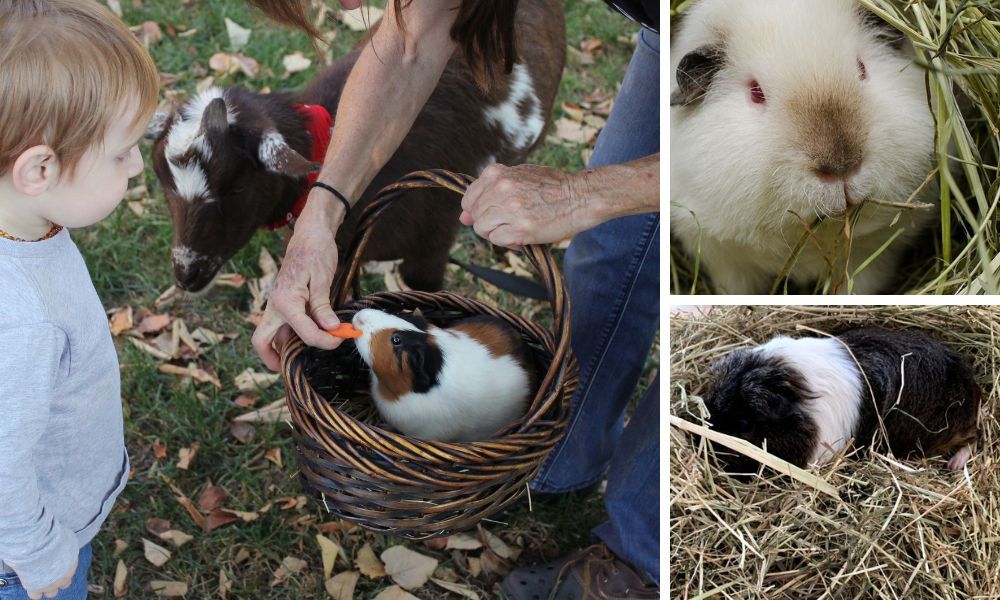
Key Takeaways:
- Timothy Hay is Essential: Timothy hay is the cornerstone of a guinea pig's diet, providing essential nutrients and aiding in dental health.
- Variety is Key: Incorporating different types of hay like orchard hay, meadow hay, and oat hay ensures a balanced diet and keeps your guinea pig engaged.
- Proper Storage Matters: Storing hay correctly ensures it remains fresh and nutritious for your guinea pig.
Introduction
Feeding your guinea pig the right way is crucial for their health and happiness. One of the most important components of their diet is hay. Providing your guinea pig with fresh hay is essential, as it ensures they receive the greenest and freshest nutrients available. But with so many types of hay available, how do you know which one is best for your furry friend? This article will guide you through the different types of hay, their benefits, and how to store hay to keep it fresh and nutritious.
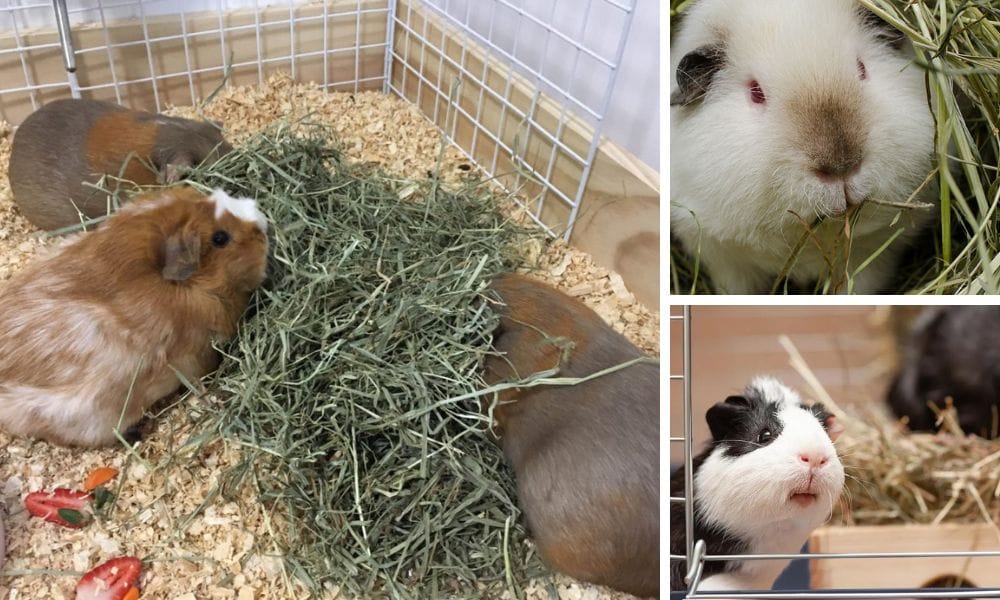
Why Hay is Crucial for Guinea Pigs
Hay is not just a treat for piggies; it is a dietary staple. Guinea pig hay, including varieties like Timothy, alfalfa, and orchard, provides the necessary fiber to keep their digestive tract functioning smoothly. Without a constant supply of hay, guinea pigs can suffer from serious health issues like gastrointestinal stasis.
Moreover, hay helps in maintaining dental health. Guinea pigs’ teeth grow continuously, and chewing on hay helps to wear them down naturally. This prevents dental problems that can lead to severe pain and difficulty eating.
Types of Hay for Piggies
Timothy Hay
Timothy hay is the gold standard for piggies. It is rich in fiber and low in calcium, making it perfect for daily feeding. Western Timothy hay is particularly popular due to its high quality and availability. Small Pet Select offers some of the freshest hay, ensuring your guinea pig gets the best.
Orchard Hay
Orchard hay is another excellent option. It is softer than Timothy hay and has a sweet smell that piggies love. Orchard grass hay is also less dusty, making it a good choice for piggies with respiratory issues.
Meadow Hay
Meadow hay is a mix of different grasses and weeds, providing a variety of textures and flavors. This type of hay is great for encouraging foraging behavior, which keeps your guinea pig mentally stimulated.
Oat Hay
Oat hay is rich in fiber and has a unique texture that piggies find irresistible. It contains seed heads that are a tasty treat for your pet. However, it should be fed in moderation due to its higher calorie content.
Alfalfa Hay
Alfalfa hay is a legume hay, rich in protein and calcium. It is ideal for young, pregnant, or nursing piggies but should be avoided for adult piggies due to its high calcium content, which can lead to bladder stones.
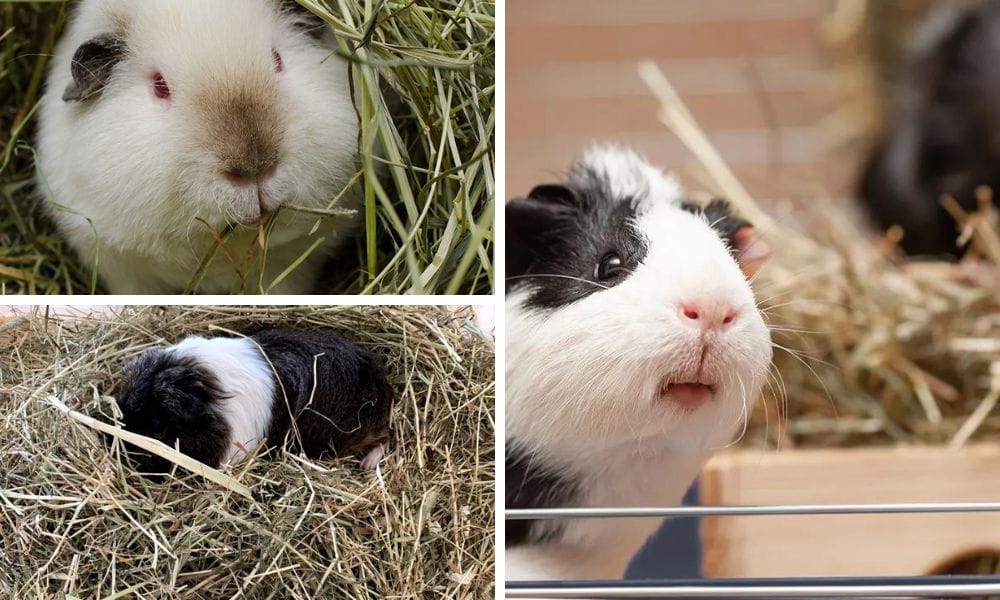
How to Introduce New Hay
Introducing new hay to your guinea pig’s diet should be done gradually. Start by mixing small amounts of the new hay with their regular hay. Observe your guinea pig’s reaction and gradually increase the amount if they seem to enjoy it.
This method helps prevent digestive issues and allows your guinea pig to get used to the new texture and taste. It also ensures that they continue to eat their hay, which is crucial for their health. Additionally, consider using botanical hay as a treat to combat pickiness and boredom.
Storing Hay Properly
Proper storage of hay is essential to maintain its freshness and nutritional value. Store hay in a cool, dry place away from direct sunlight. Use breathable bags or containers to prevent mold growth.
Avoid storing hay in plastic bags as they can trap moisture, leading to mold. Instead, opt for cloth bags or cardboard boxes. Regularly check the hay for any signs of mold or pests to ensure it remains safe for your guinea pig.
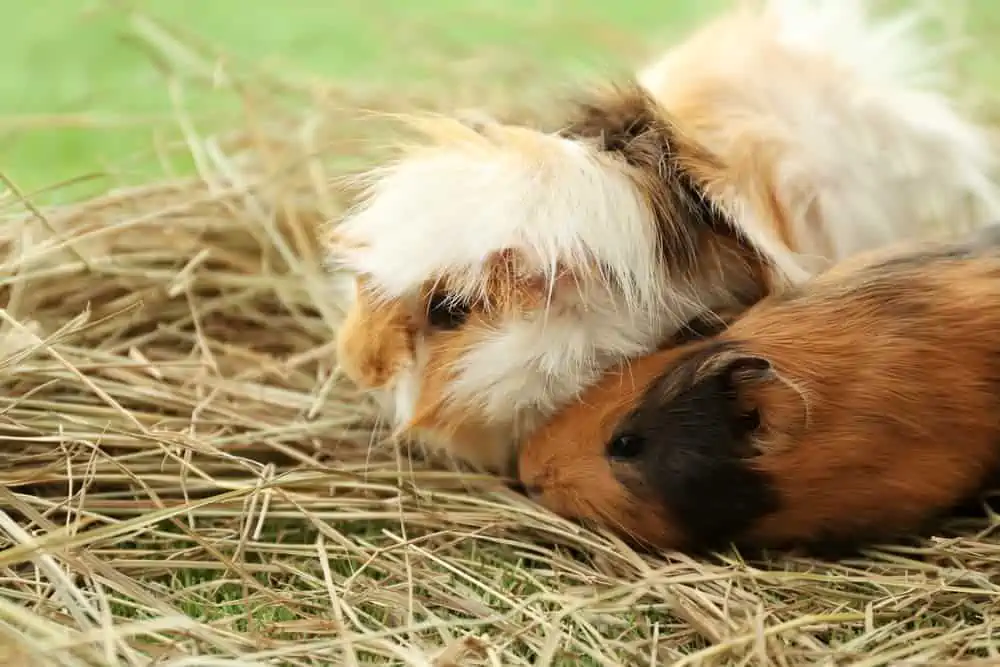
How Much Hay Should You Feed?
Guinea pigs should have unlimited access to fresh hay. It should make up the majority of their diet, supplemented with fresh vegetables and a small amount of pellets. Grass hays, such as Western Timothy Hay, are essential for their high-fiber content and nutritional benefits. Ensure that hay is always available in their cage.
Monitor your guinea pig’s hay consumption to ensure they are eating enough. If you notice a decrease in hay intake, it could be a sign of dental or health issues, and a visit to the vet may be necessary.
Benefits of Different Hay Varieties
Timothy Hay
Timothy hay is excellent for maintaining a healthy digestive system and preventing obesity. Its high fiber content ensures that your guinea pig's digestive tract functions smoothly.
Orchard Hay
Orchard hay is softer and more palatable, making it a good option for picky eaters. Its sweet aroma can entice piggies to eat more hay, ensuring they get the necessary fiber.
Meadow Hay
Meadow hay provides a variety of textures and flavors, which can keep your guinea pig engaged and prevent boredom. It also encourages natural foraging behavior.
Oat Hay
Oat hay is a great occasional treat due to its unique texture and seed heads. It provides variety in your guinea pig's diet and can be used to encourage eating in picky guinea pigs.
Alfalfa Hay
Alfalfa hay is ideal for young, pregnant, or nursing guinea pigs due to its high protein and calcium content. It supports growth and development in young guinea pigs.
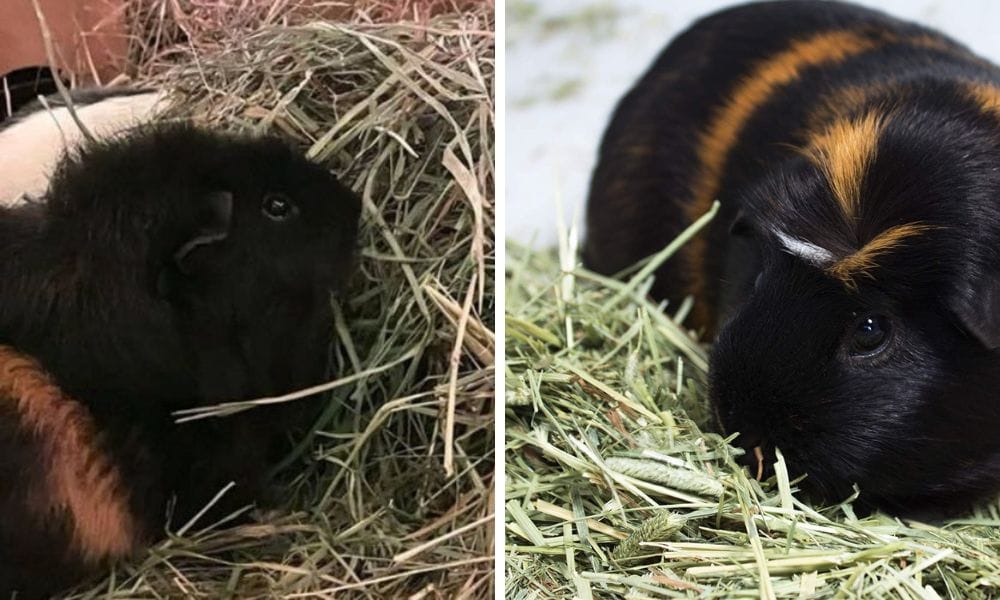
Common Mistakes to Avoid
Feeding Only One Type of Hay
Feeding only one type of guinea pig hay can lead to nutritional imbalances. Incorporate different types of hay to provide a balanced diet and keep your guinea pig interested in their food.
Not Storing Hay Properly
Improper storage can lead to moldy or stale hay, which can be harmful to your guinea pig. Always store hay in a cool, dry place and check regularly for signs of mold or pests.
Overfeeding Alfalfa Hay
Alfalfa hay is high in calcium and should only be fed to young, pregnant, or nursing guinea pigs. Overfeeding alfalfa hay to adult guinea pigs can lead to bladder stones and other health issues.
Conclusion
Feeding your guinea pig the right way involves providing a variety of high-quality hay as a crucial part of a guinea pig's diet. Timothy hay, orchard hay, meadow hay, and oat hay each offer unique benefits and keep your guinea pig healthy and happy. Proper storage and gradual introduction of new hay types are essential to maintain their nutritional value and ensure your guinea pig enjoys their food. Always ensure you are providing the greenest and freshest hay available to enhance their dietary experience.
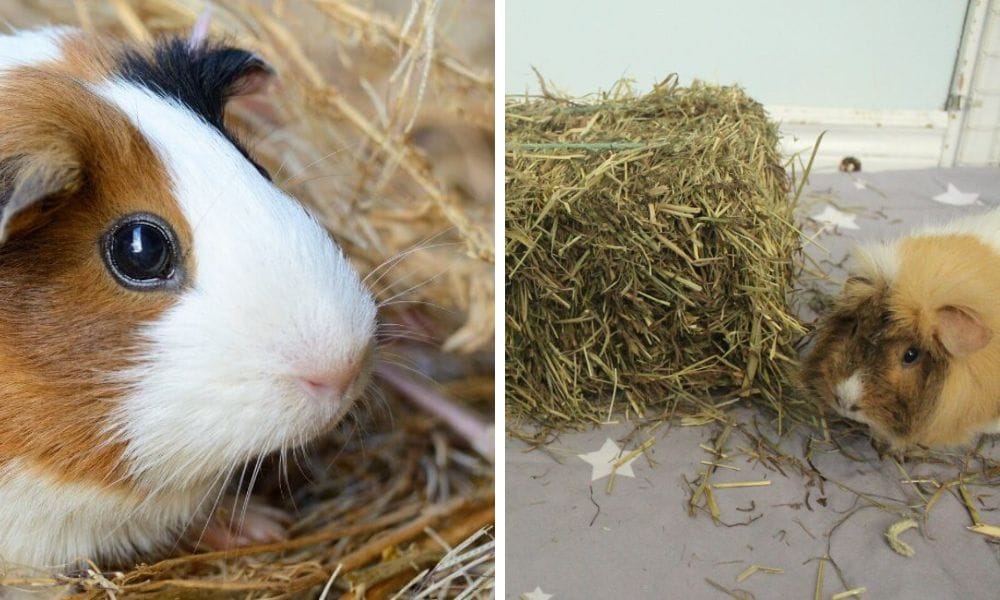
Summary
Guinea pig hay is a crucial component of a guinea pig’s diet, providing essential fiber and aiding in dental health. Timothy hay is the best choice for daily feeding, while orchard hay, meadow hay, and oat hay offer variety and additional benefits. Proper storage and gradual introduction of new hay types are essential to maintain their nutritional value and ensure your guinea pig enjoys their food. Grass hays, such as Western Timothy Hay, are particularly important for their high-fiber content and nutritional benefits, supporting gastrointestinal health and dental care.
FAQ
What is the best hay for piggies?
Timothy hay is the best hay due to its high fiber content and low calcium levels. It is ideal for daily feeding and supports both digestive and dental health.
How much hay should I feed my guinea pig?
Guinea pigs should have unlimited access to hay. It should make up the majority of their diet, supplemented with fresh vegetables and a small amount of pellets.
Can I feed my guinea pig alfalfa hay?
Alfalfa hay is suitable for young, pregnant, or nursing guinea pigs due to its high protein and calcium content. However, it should be avoided for adult guinea pigs to prevent health issues like bladder stones.
If you are interested in find out more about the right balance between hay and other food in guinea pig's diet, feel free to read our blog that talks about that here.
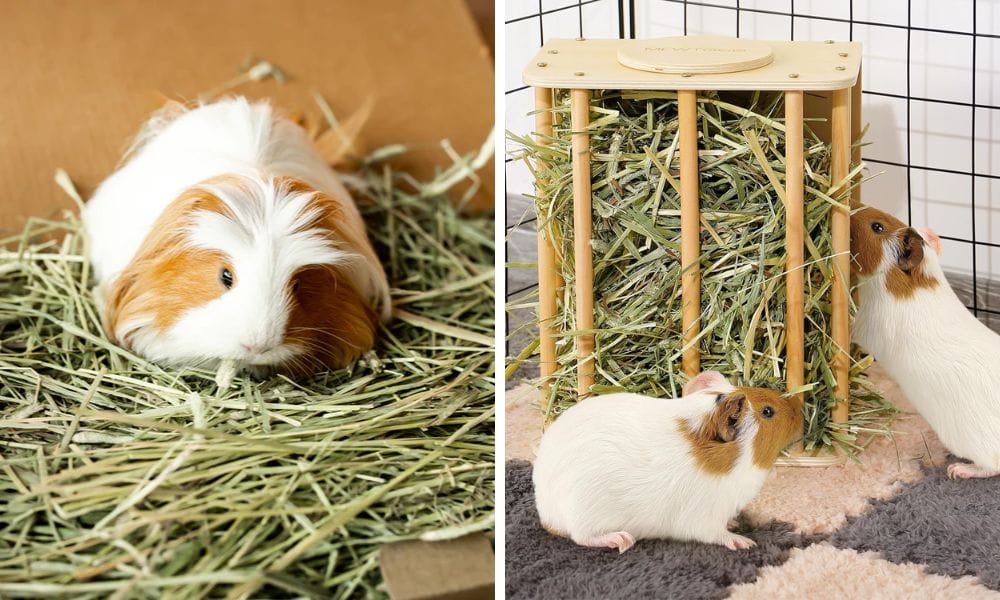
All in all, choosing the right type of hay for your guinea pig's diet doesn't have to be complicated if you know what you're looking for! Factors such as protein content, fiber content, vitamin/mineral levels, and variety are all important factors when selecting appropriate hays for your pet's dietary needs. With these tips in mind, you can choose hays that will provide optimal nutrition for your furry little friend without any hassle!
Looking for a high quality hay for you guinea pig? We have done all the research for you and put together our list of top 5 high quality hays for guinea pigs you can buy today! Tap the button below to see the list now!
